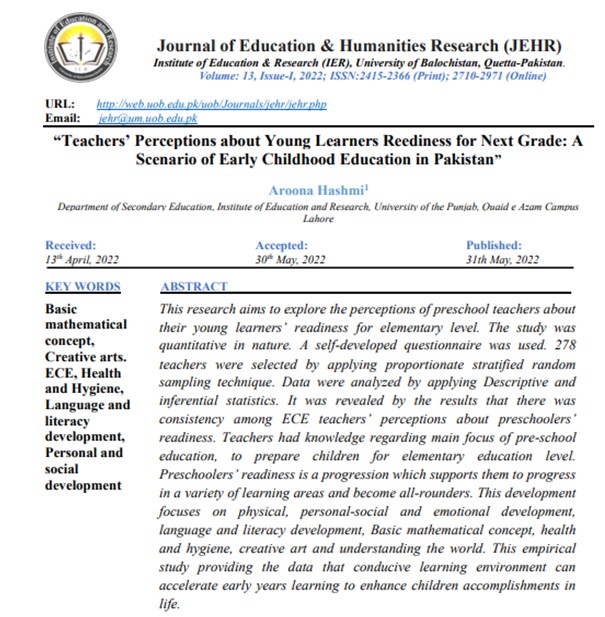Teachers’ Perceptions about Young Learners Reediness for Next Grade: A Scenario of Early Childhood Education in Pakistan
Keywords:
Basic mathematical concept, Creative arts. ECE, Health and Hygiene, Language and literacy development, Personal and social developmentAbstract
This research aims to explore the perceptions of preschool teachers about their young learners’ readiness for elementary level. The study was quantitative in nature. A self-developed questionnaire was used. 278 teachers were selected by applying proportionate stratified random sampling technique. Data were analyzed by applying Descriptive and inferential statistics .It was revealed by the results that there was consistency among ECE teachers’ perceptions about preschoolers’ readiness. Teachers had knowledge regarding main focus of pre-school education, to prepare children for elementary education level. Preschoolers’ readiness is a progression which supports them to progress in a variety of learning areas and become all-rounders. This development focuses on physical, personal-social and emotional development, language and literacy development, Basic mathematical concept, health and hygiene, creative art and understanding the world. This empirical study providing the data that conducive learning environment can accelerate early years learning to enhance children accomplishments in life.
References
Abu Taleb, T. F. (2013). Necessary school readiness skills for kindergarten success according to Jordanian teachers. Early Child Development and Care, 183(12), 1878-1890. doi:10.1080/03004430.2012.759950
Britto, P. R. (2012). Student readiness; A Conceptual Framework. Retrieved from United Nations Children’s Fund Education Section, Programme Division Three United Nations Plaza New York, New York 10017 website: https://www.unicef.org/earlychildhood/files/Child2Child_ConceptualFramework_FINAL(1).pdf
Copple, C. & Bredekamp, S. (ED.). (2009). Developmentally Appropriate Practice in Early Childhood Programs. Washington, DC: National Association for the education of Young Children.
Cappelloni, N. L. (2011). Kindergarten teachers’ perceptions of kindergarten readiness. Belvedere CA: University of San Francisco.
Fayez, M., Ahmad, J. F., & Oliemat, E. (2016). Jordanian Kindergarten and 1st-Grade Teachers’ Beliefs about child-based Dimensions of Student readiness, Journal of Research in Childhood Education, 30:3, 293-305, DOI:10.1080/02568543.2016.1178195
Feeney, S., Moravick, E., & Nolte, S. (2016).Chapter 4: Child Development. Upper Saddle River: Pearson.
Government of Pakistan (2017). National Curriculum for Early Childhood Education 2017, Islamabad: Ministry or Education.
Hashmi, A., & Akhter, M. (2013). Assessing the parental involvement in schooling of children in public/private schools, and its impact on their achievement at elementary level. Journal of Educational Research, 16(1), 27.
Hashmi, A., Mubashar, R., & Altaf, F. (2020) Implementation of Early Childhood Care and Education Curriculum 2017: A Case Study of Pakistani Public Schools. Global Regional Review, V(I), 604-615. doi:10.31703/grr.2020(V-I).63
Hatcher, B., Nuner, J., & Paulsel, J. (2012). Kindergarten readiness and preschools: Teachers’and parents’ beliefs within and across programs. Early Childhood Research & Practice, 14 (2)
Kotaman, H. (2014). Turkish classroom teachers' views on student readiness: a phenomenological study, Education 3-13, 42:5, 542-553, DOI: 10.1080/03004279.2012.736401
Mubashar, R., Hashmi, A., & Altaf, F. (2020) Factors Affecting Teachers’ Practices in Implementation of Early Childhood Care and Education Curriculum in Public Schools. (GSSR), V (I), 623 ‒ 632. URL: http://dx.doi.org/10.31703/gssr.2020(V-I).62
Pianta, R. C., Barnett, W. S., Justice, L. M., & Sheridan, S. M. (2012). Handbook of early childhood education. New York: The Guilford Press. Institute for Studies in Education.
Shore, A., & Rima, S. (1998). Ready School: A report of the goal 1 ready school resources group. Washington: National Education Goals Panel.
U.S. Department of Health and Human Services (2015). The head start learning outcomesframe work.http://www.ohcac.org/HeadStart/HS_Revised_Child_Outcomes_Framework(rev-Sept2011).pdf




